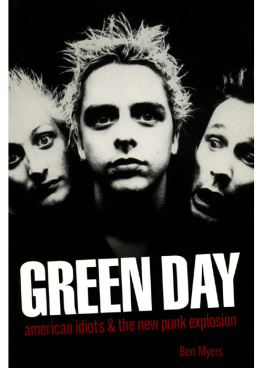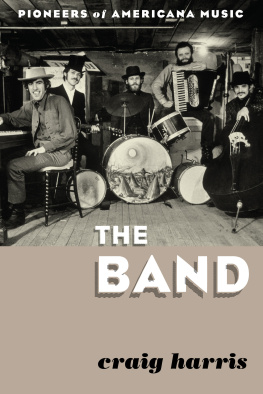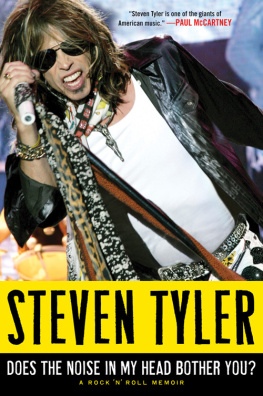HSKER D
THE STORY OF THE NOISE-POP PIONEERS
WHO LAUNCHED MODERN ROCK
Andrew Earles

This book is dedicated to the memory of my father, Dennis A. Earles (1923-1993).
First published in 2010 by Voyageur Press, an imprint of MBI Publishing Company, 400 First Avenue North, Suite 300, Minneapolis, MN 55401 USA
Copyright 2010 by Andrew Earles
PLC edition published in 2010. Digital edition 2010.
All rights reserved. With the exception of quoting brief passages for the purposes of review, no part of this publication may be reproduced without prior written permission from the Publisher.
The information in this book is true and complete to the best of our knowledge. All recommendations are made without any guarantee on the part of the author or Publisher, who also disclaims any liability incurred in connection with the use of this data or specific details.
We recognize, further, that some words, model names, and designations mentioned herein are the property of the trademark holder. We use them for identification purposes only. This is not an official publication.
Voyageur Press titles are also available at discounts in bulk quantity for industrial or sales-promotional use. For details write to Special Sales Manager at MBI Publishing Company, 400 First Avenue North, Suite 300, Minneapolis, MN 55401 USA.
To find out more about our books, visit us online at www.voyageurpress.com.
Digital edition: 978-1-61673-979-9
Hardcover edition: 978-0-7603-3504-8
Library of Congress Cataloging-in-Publication Data
Earles, Andrew, 1973
Hsker D : the story of the noise-pop pioneers who launched modern rock /
Andrew Earles.
p. cm.
Includes index.
ISBN 978-0-7603-3504-8 (plc)
1. Hsker D (Musical group) 2. Rock musiciansUnited StatesBiography. I.
Title.
ML421.H86E27 2010
782.421660922dc22
[B]
2010026096
Design Manager: Katie Sonmor
Cover and Book Design: John Barnett / 4 Eyes Design
Layout: Elly Gosso
Printed in the United States of America
CONTENTS
INTRODUCTION
These introductions often find the author spinning some poignant tale about the first time he or she was introduced to the band that they are writing about. Usually, its an incredibly boring and self-serving story, and the circumstances detailed are in no way unique but, in fact, shared by most fans of the band. I would never bore you with the story of my discovering this band. Having stated that, the music of Hsker D is undoubtedly among the core works that massively impacted my taste and frame of reference. I do love this bands music; a fact that has remained unchanged since age sixteen.
But thats not why my name is on a book about Hsker D.
When discussing music-based nonfiction, three goals pop to mind: criticism, telling a good story, and documenting the importance of an artists work (to his or her contemporaries, to those who have followed, and to those who will make music in the future). Many books cover all three goals to some degree because its impossible to address one without discussing the others, and this book is no exception. However, I have hopefully placed an obvious weight on the latter aspect. Hsker Ds body of work has not yet received its deserved exposure, nor is its influence on the past twenty-five years understood in the same way that the influences of, say, Black Flag, Sonic Youth, or Slayer are understood.
In the time since their breakup, Hsker Ds legacy has been grossly mishandled by the music press. As a result, the bands body of work has been transformed into something unapproachable. For a young music fan interested in learning about the band, being subjected to even a paragraph of tired, misguided speculation about the dynamic between Bob Mould and Grant Hart before getting to the goods (e.g., the best place to start, why the music is influential, what the musicians went through to make it, etc.) can confuse and perpetuate a continual game of Chinese telephone. There are more people carrying around salacious untruths about Hsker D (in case conversation calls for them) than there are people who have actually heard Hsker D. If this book shifts that trend in the right direction, even by a tiny degree, I will consider it a personal success.
So be warned: Readers of this book will be disappointed if they hope to be rewarded with the gritty details of any band members drug use. In the beginning, Hsker D did not play fast due to amphetamines. In the end, Grant Harts drug use did not break up the band. About a year ago, I received an email that began with excitement over the fact that someone was writing a book about Hsker D. Then the writer asked, So I gotta know did Grant and Bob get it on? The fact is Harts and Moulds sexuality has absolutely nothing to do with why this band is important.
Ive also gotten email requests for Just one story, man, come on! And, of course, there are more than a few people, including one festival organizer, who believe I hold the definitive answer to the question So, do you think they will reunite? Despite all three members continued denials, this last question is still occasionally fueled by the October 2004 appearance of Mould and Hart together onstage at a benefit for cancer-stricken friend Karl Mueller of Soul Asylum (they played Never Talking to You Again and Hardly Getting Over It). I cant predict the future, but I can tell readers with certainty that I hope they do not reunite onstage in front of thousands upon thousands of people (because I guarantee thats what the draw would be). What I do hope is that they reunite in a rented banquet room in a quiet Holiday Inn, in someones living room, or over a good meal in a restaurant where no one will recognize them. From there, I hope they take the necessary measures to gain control of their back catalog so that a conscientious label can produce the lavish reissue jobs their music deserves. Then I hope each man can continue his life with a little less stress and a little more happiness. These idealistic, possibly nave wishes are further delayed each time a certain type of Hsker D coverage sees the light of day. Actually, this type of coverage isnt really a type because there really hasnt been an alternative. The acrimony between band members is as much a product of shoddy journalism as it is a product of any band members mouth.
These are human beings who at one time, around a quarter-century ago, created a type of rock n roll that is so important to the forms overall evolution that many bands we now take for granted would have never existed or would have sounded completely different without Hsker Ds influence: Nirvana, Foo Fighters, Superchunk, Pavement, Deftones, Pixies, My Bloody Valentine, Guided by Voices the list goes on. Listen to side two of Zen Arcade or even just to Moulds Ill Never Forget You. How similar does this sound to noise-rock of the 90s? Grant Harts Dont Want to Know If You Are Lonely is the blueprint for a sizeable chunk of the indie-and alt-rock movements that would flip the music business on its ear just five years after the release of Candy Apple Grey in 1986.
Anyone who came up going to loud, sparsely attended shows in the 90s knows that many very, very loud bands blasted their noise-drenched melodies (or anti-melodies) into empty clubs. Hsker D was one of a tiny handful of bands that invented that air-moving level of volume. Hsker D also helped to create the network of clubs that still exists and was crucial in laying the groundwork that supports the wildly successful pop-punk movement led by Green Day, the Off-spring, NOFX, second-act Bad Religion, the Epitaph and Fat Wreck Chords labels, and the Vans Warped Tour.





